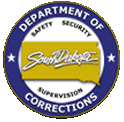South Dakota Public Safety Improvement Act
Criminal Justice Initiative
The South Dakota Department of Corrections is working on the implementation of the various aspects of the South Dakota Public Safety Improvement Act (SDPSIA), also known as the Criminal Justice Initiative, approved by state lawmakers and signed into law by Gov. Dennis Daugaard in 2013.
DOC is actively engaging with state agency partners in SDPSIA implementation work, including the Unified Judicial System, Attorney General’s Office, and Department of Social Services, and undertaking steps to provide information and training to staff and external partners regarding the initiative.
Among the components of the SDPSIA that impact the DOC are:
*A parolee who has a successful month on parole will be given that number of days off the end of his or her sentence. These credits cannot be revoked once earned. If a parolee has a misstep and violates his/her supervision agreement and the response to the violation is short of a revocation, the parolee will not receive credit for that month. However, once the sanction is completed and he/she has another successful month, another month of credit will be granted. Sentences for sex offenses, failure to register and community safety zone violations are not eligible for Earned Discharge Credits.
*In cooperation with the state Department of Tribal Relations, the DOC is working to develop one or two tribal parole pilot programs to supervise parolees on tribal land. This pilot program will utilize a tribal-state liaison officer. The officer will be required to use supervision strategies that focus on reducing recidivism and employ evidence-based practices and swift, certain and proportionate sanctions. VERA Institute of Justice article
*Performance and outcome measures are being developed for tracking on an on-going basis by the 13-member Oversight Council responsible for reviewing and monitoring the implementation of the SDPSIA provisions. An annual report will also be developed on the measures.
* Annual training of parole agents will be developed on evidence-based practices, criminal risk factors and targets to reduce recidivism. The training will include working with Effective Practices In Community Setting (EPICS) and core correctional practices.
*Parole Board members will undergo annual training on the use of risk and needs assessments and the use of evidence-based practices in making parole decisions. Newly appointed parole board members will undergo the training within 60 days of being appointed. Parole Board training will be developed from information from the National Institute of Corrections, the Association of Paroling Authorities International or the American Probation and Parole Association.
*The DOC will validate risk and needs assessments including the Level of Service Inventory-Revised (LSI-R) and the Community Risk Assessment.
*A pilot program will be established in which Community Transition Program (CTP) beds will be contracted for in the community, rather than the parolee being placed in one of the DOC’s minimum security units.
* DOC victim information will interface with a statewide victim notification system being developed by and which will be administered by the Attorney General’s Office.
*A joint approach will link the DOC and the Unified Judicial System (UJS) in order to collect restitution from offenders. The Administrative Financial Accountability System will be made up of offenders who still owe court ordered obligations who have discharged from prison or parole. Their financial obligations will be transferred to the new system, which UJS will administer.
A SDPSIA implementation work plan has beendeveloped, with major components assigned to internal workgroups with project charters and monthly progress reports being developed.
Updates on the implementation progress will be posted here.
Resources
Criminal Justice Initiative Workgroup Final Report
Click on the pictures below to view a larger version.



